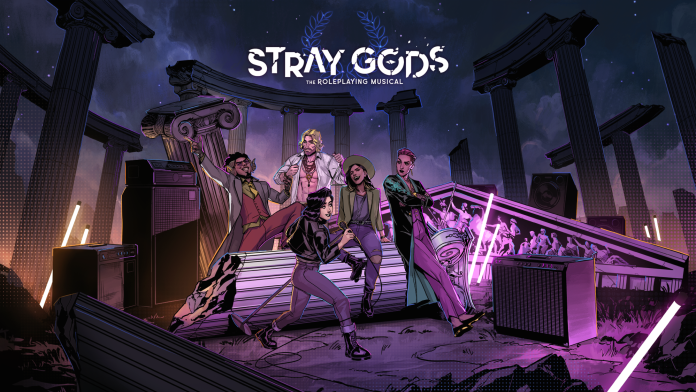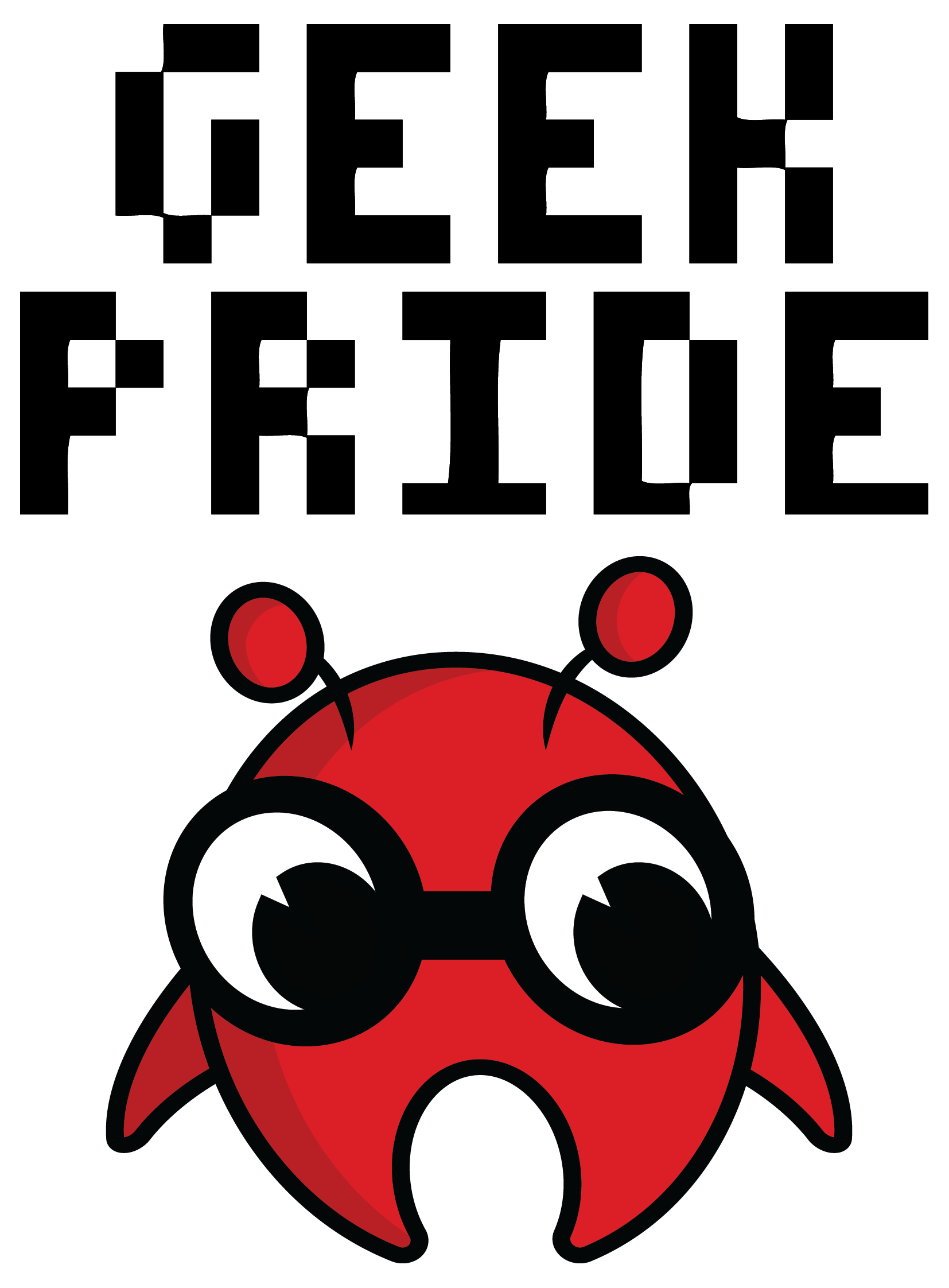To know the story of Stray Gods, we must first know the story of David Gaider and how he came to co-found Summerfall Studios in Melbourne, Australia in 2019. Gaiter. Coming from a lengthy career in the video game industry with BioWare, including handing the quill for Baldur’s Gate 2: Shadows of Amn, he was already responsible for writing a number of BioWare’s success stories, such as Star Wars: Knights of the Old Republic to The Dragon Age series. He departed the company in January 2016, moving to work as Creative Director at Beamdog, which he would then leave in February 2018.
Why the preamble? Well, Stray Gods: The Roleplaying Musical is Summerfall Studio’s first project, funded by Creative Victoria – a state government body dedicated to supporting Victoria’s Creative industries – and a largely successful crowdfunding campaign on the platform Fig (reaching 115% of its $600,000 goal). Originally named Chorus: An Adventure Musical, the project set out its inspirations from the start, citing musicals like Buffy: Once More With Feeling, Dear Evan Hansen, Hadestown and Wicked, as well as videogames like the Dragon Age series, Life is Strange, and Dream Daddy. Whilst it never quite managed to smash through its stretch goals, the stage was set for Stray Gods to take the spotlight.
Stray Gods sets out to work as a part interactive musical and part illustrated adventure game, with a dash of character-driven narrative and a dusting of romance. Initially aiming for a PC release, the project managed to successfully launch across a range of platforms including Xbox, Playstation and Nintendo.
The game places you in the shoes of Grace, who must navigate through a treacherous new world with the power of music. Assuming the role of the Muse upon the death of her new friend Calliope, Grace finds herself charged with murder by The Chorus – a group of Greek Gods who still operate beneath the world as we know it as it emerges that perhaps those myths and legends about Greek Gods and monsters might not be so farfetched after all. Driven to discover the truth, Grace gains a stay of execution and a week to uncover the true tale that lies beneath – and so, armed with her newfound ability to draw others into you might just be able to draw characters in just enough to change their mind, perhaps let slip a confession, or even fall in love. It is up to you, and the direction you decide to take.
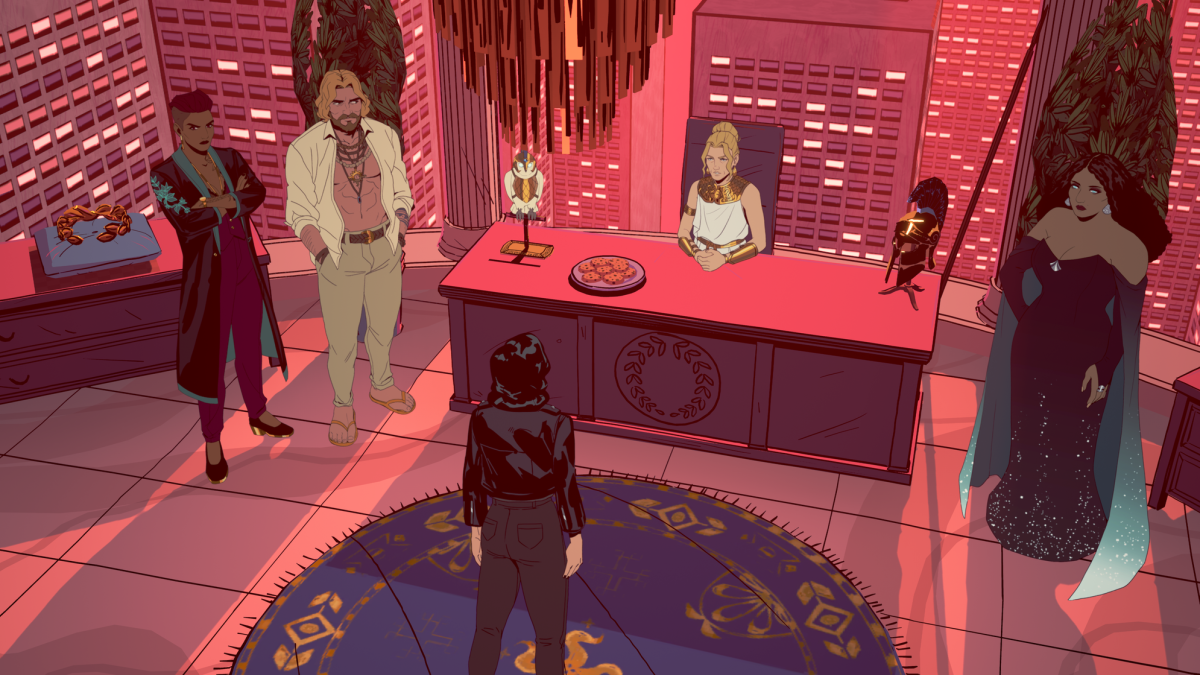
But before the plot goes down, the game starts off like your typical visual novel – conversations pause in order to present you with an array of dialogue choices, each allowing you to take the conversation in a particular direction…such as gaining insight into colleague, pressing forwards with the story, or even flirt a little to kickstart a possible romance. However, unlike the dialogue trees of Telltale visual novels or the branching choices of BioWare games, the game also doesn’t hide that music lies at its very heart.
The story starts with auditions for Grace’s band, and once her bandmates leave Grace takes to the stage to sing a personal ballad about feeling adrift – and it is Grace’s heart, laid bare in music, that draws in Calliope and from there we follow Grace’s story. A musical game is a bold direction to take, and the game boasts an impressive cast list who have been known to carry a tune or two to make it work, such as Laura Bailey and Ashley Johnson – our Grace and Calliope – might be known for their work in film and video game voiceover work, but have also carried the tune in ‘Your Turn To Roll’ for the webseries Critical Role.
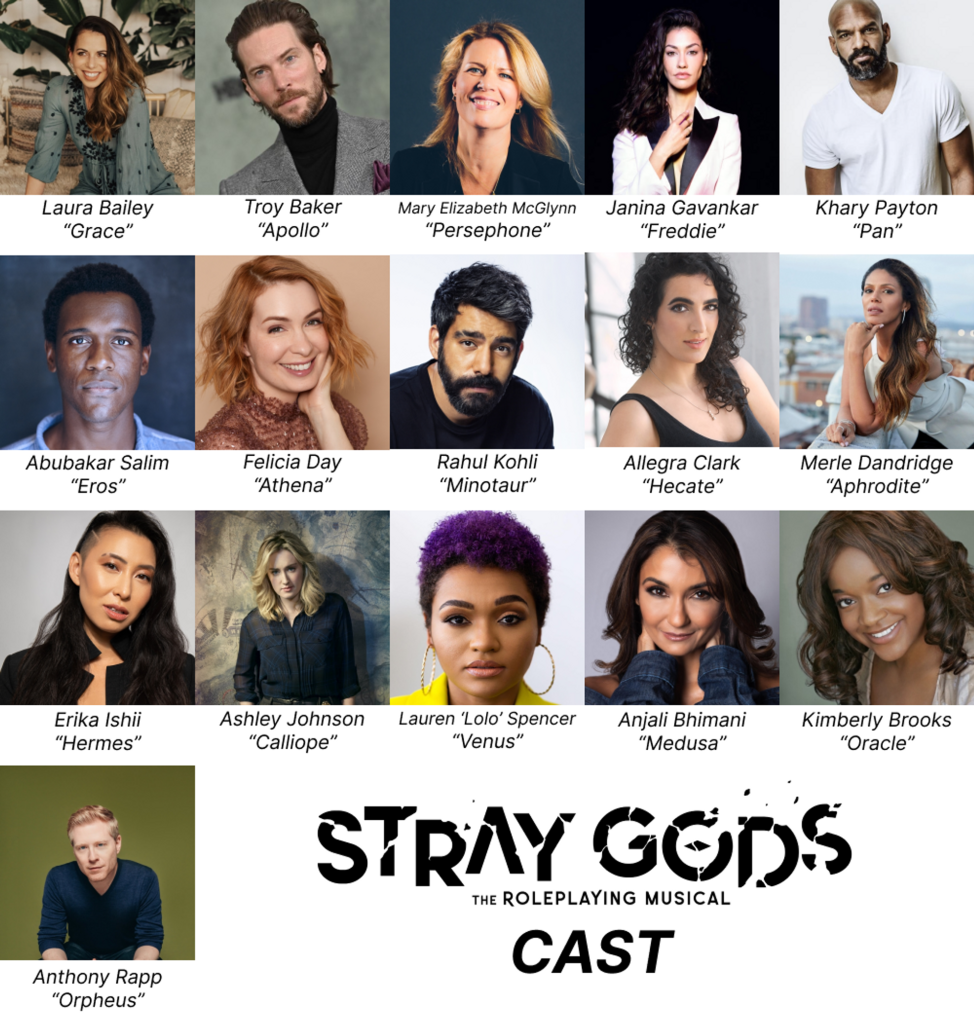
The musical numbers which emerge through the course of the game help you steer the flow of the narrative, as time-sensitive choices often emerge during the course of these moments – you can choose to be Charming, Kickass or Clever. In addition to providing some direction to the narrative through conversations, each Trait can also have an impact on the direction of the song too, changing up the tone to be either more delicate or perhaps more rock’n’roll with a distinctly notable beat and lyric change. These can make for some fascinating experimentation with songs as you switch tones, coaxing out different aspects of other characters in which they might let slip or lose themselves to the rhythm.
These natures come with pros and cons, and ultimately some of the responses in the game are limited to certain natures – in order to make that option available to you, you might have to undertake different playthroughs in order to satiate your curiosity. Certain outcomes are not necessarily locked, but are easier to achieve with certain natures, so it’s not as expressly linear as you might expect from a visual novel.
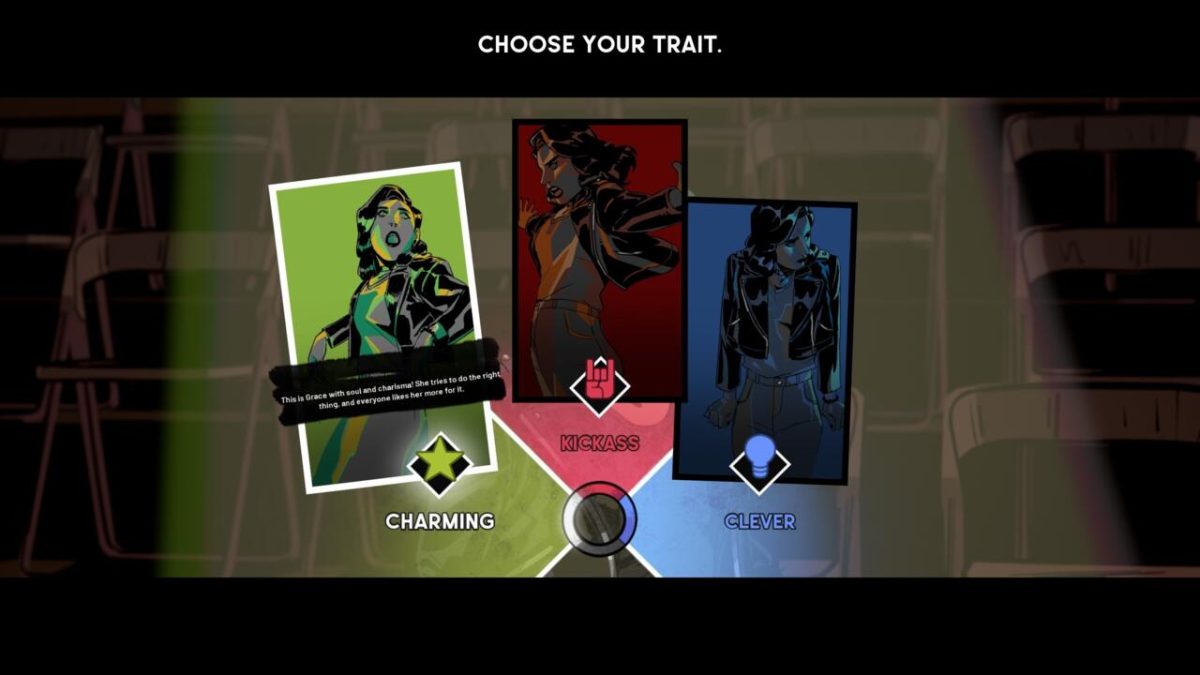
It should also be noted that all this takes place in a gorgeous comic book art style, reminiscent of The Wicked + The Divine which allows for some fantastic hand-drawn visualisations of various icons and recognisable deities. In particular, Grace has an excellent design with a variety of illustrations to convey expressions and emotions that lean on the superb writing that encapsulates her story. This can be notable against some other characters, but for the most part each character is given their own personal style and are decked out in personal accessories that suit the characterisation. Locations are similarly given love and attention to detail, from the opening audition room to best pal Freddy’s apartment to the Olympus office.
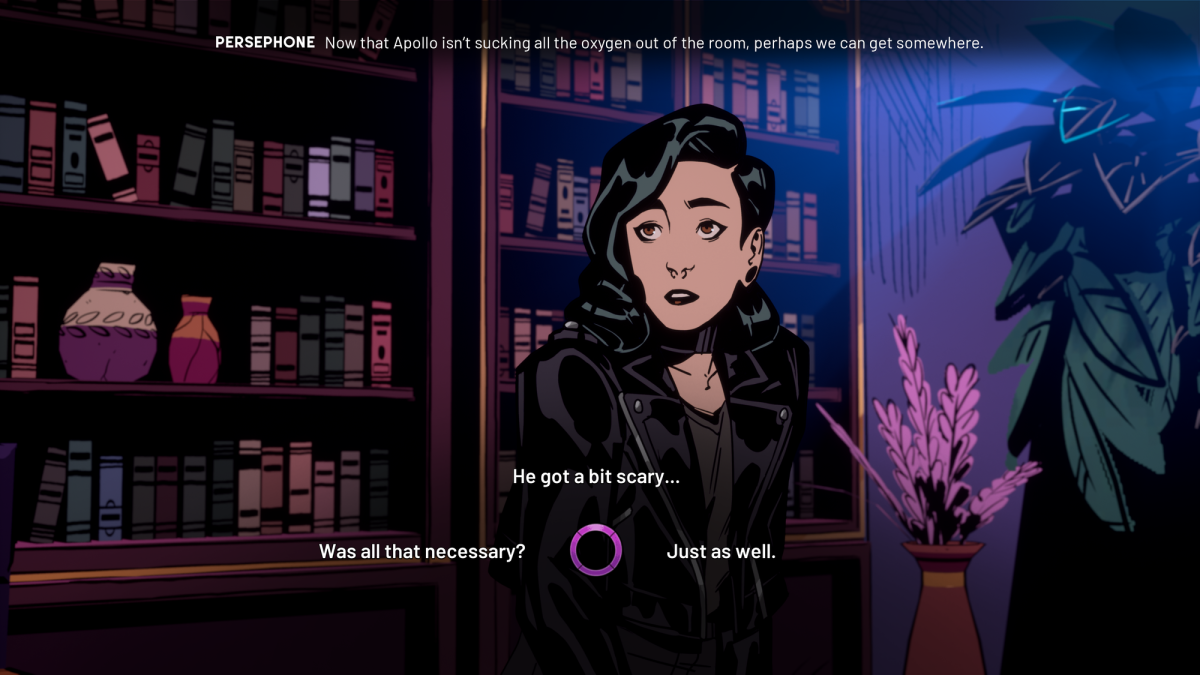
If I have one complaint, it’s that the art style makes a choice to stick to the comic book art style by removing a majority of lip animations. This is not uncommon, and is fairly standard for visual novel games – old ‘Ace Attorney’ games stand as a testament to this fact – however, it feels off when songs are the beating heart of what makes your games unique. When you have music and lyrics take the centre stage for your game, there’s an odd, disjointed feeling when you listen to the audio coming from the closed mouths of characters.
Music, as with art, is also a beauty held in the eye of the beholder, and so it is worth noting that this game is a joy to play if you enjoy visual novels and musicals. The two are seamlessly interwoven into one another, and are at the core of this game – its heart beats to a melody of your choosing, but that melody can strike up and take control of the narrative.
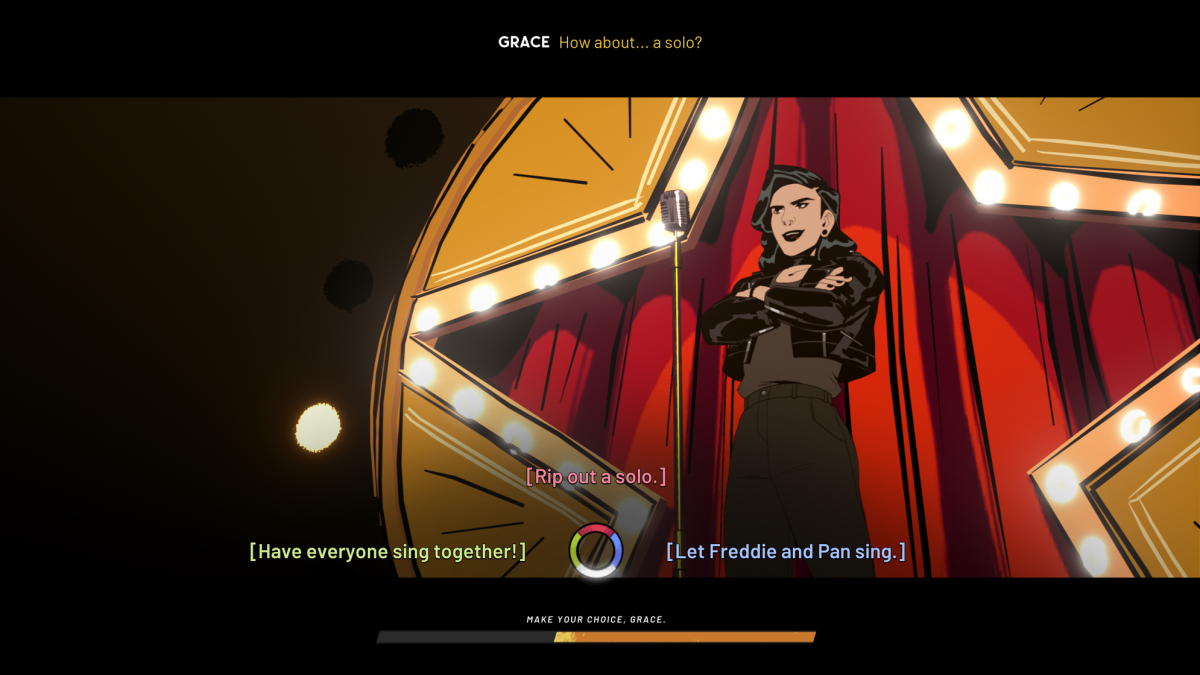
Despite my minor quibble, I found myself thoroughly invested in the music, the story and gameplay, which I also found to be thoroughly accessible. All these aspects are wrapped around a narrative which drove me not just to uncover the murderer in my own unique way, but to consider how a different playthrough with distinct choices that would still make me feel the weight of some narrative-swaying moments.


